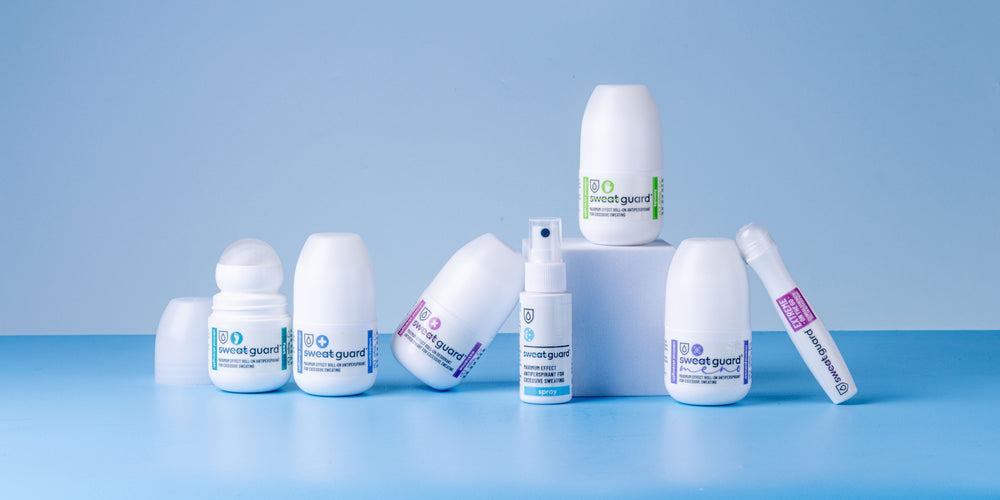Is Aluminium Harmful? Separating Fact from Fiction
As sufferers search for effective treatments for hyperhidrosis, aluminium in personal care products like antiperspirants often emerges as a point of discussion, confusion and concern. In this blog post, we'll delve into the science behind aluminium in antiperspirants, address common misconceptions, and provide a comprehensive overview of whether aluminium poses a genuine risk for people living with hyperhidrosis or needing to treat excessive sweating in its various forms.
Aluminium in Antiperspirants: Understanding the Connection

Aluminium is found in the environment because of its natural occurrence in soil and water. It is therefore found in various foods and beverages. Common foods that may contain aluminium include fruits, vegetables, grains and certain food additives and dietary supplements. Aluminium levels can also be influenced by food processing and packaging techniques for instance, aluminium foil and containers can lead to slight aluminium transfer into foods. The human body has evolved efficient mechanisms for aluminium excretion, and most aluminium intake from these sources is well below established safety limits and is naturally eliminated. So the issue is ensuring Aluminium exposure is below safety limits.
Aluminium salts like aluminium chloride, aluminium chlorohydrate or aluminium zirconium tetrachlorohydrex gly have been in development and widely used in antiperspirants throughout the world since 1916. This is because they have consistently been found to be more effective at reducing perspiration. While alternative ingredients like natural minerals (e.g. magnesium, zinc), botanical extracts, or various absorbent materials have been explored. Their efficacy in terms of sweat reduction has been less potent than aluminium compounds. Whilst it’s true that these compounds are a central component in the formulation of the most effective antiperspirants, the question arises: is their use safe in the long run?
Safety Concerns and Misconceptions
These have arisen among certain consumer groups and often fuelled by vested commercial interests promoting alternative products. One of the most notable concerns associated with aluminium in antiperspirants is its potential link to Alzheimer's disease and breast cancer. However, many studies have examined this claim and established no conclusive evidence connecting aluminium exposure through antiperspirants to these health issues. The Alzheimer's Society and Cancer Research UK maintain that there is no consistent evidence to support these fears.
Aluminium Absorption through the Skin
Studies have shown that a minimal amount of aluminium may be absorbed through the skin from antiperspirants at levels well below established safety limits. This is because the aluminium ions from the antiperspirant primarily form a barrier on the skin's surface. The daily use of antiperspirants results in an estimated aluminium exposure of around 0.01 to 0.1 milligrams (mg) per day, which is significantly lower than the tolerable weekly intake (PTWI) of aluminium established by the joint FAO/WHO Expert Committee (JECFA) at 2mg at aluminium per kilogram of body weight. Dietary sources contribute a much larger portion of total aluminium intake compared to the application of antiperspirants to the skin.
Regular use of antiperspirants is not associated with a harmful accumulation of aluminium in the body. A quote from Cancer Research UK’s website, “Some people have wondered if aluminium in some deodorants and sprays increases cancer risk. There is no good evidence to suggest this.” The Alzheimer’s Society is also emphatic about their response to aluminium, “No convincing relationship between the amount of exposure or aluminium in the body and the development of Alzheimer's disease has been established.”
Risk-Benefit Analysis for people living with Hyperhidrosis
For those grappling with hyperhidrosis, the discomfort and impact on daily life can be substantial. In this context, the use of the most effective aluminium-containing antiperspirants should be weighed against the theoretical concerns raised by certain consumer and commercial interest groups. Experts recommend considering the immediate benefits of effective sweat reduction and enhanced quality of life against the known low exposure level and, therefore, theoretical risks, which have been investigated and not been proven.
Misinformation and fake news often spreads easily, especially in today's age of rapid communication and social media. Stories and articles that raise concerns about the safety of antiperspirants can gain traction even without solid scientific backing. Misunderstandings or oversimplification of scientific studies can lead to exaggerated claims and fears.
It's important to note that scientific research is ongoing, and while concerns have been raised, studies conducted so far have not shown a clear, consistent link between aluminium-containing antiperspirants and serious health issues. Regulatory agencies like the U.S. Food and Drug Administration (FDA) and the European Commission's Scientific Committee on Consumer Safety (SCCS) have reviewed the evidence and have not found sufficient reason to ban or restrict the use of aluminium compounds in antiperspirants. Here in the UK The Medicines and Healthcare products Regulatory Agency (MHRA) and the Cosmetic, Toiletry, and Perfumery Association (CTPA), have stated that the use of aluminium compounds in personal care products, including antiperspirants, is safe when used as intended.
SWEAT GUARD: Where Science and Safety Shield Our Customers

In understanding the science behind the use of aluminium, Sweat Guard®, has taken the following approach in developing and formulating our “no sweat” antiperspirants.
Our antiperspirants do not contain aluminium chloride the first generation of aluminium antiperspirants.
Whilst this generation of Aluminium Chloride products can be effective it is the fact that when combined with sweat an interaction can occur resulting in Hydrochloric Acid (HCl). It is HCl that can then cause side effects such as irritation, burning, stinging.
Sweat Guard® antiperspirants contain the latest generation of active ingredients at safe levels to make the products more effective yet reduce the risk of common side effects such as irritation, burning and stinging which can often occur with other prescription or high strength products.
The active ingredient in our antiperspirants is a new generation clinically proven compound called ‘aluminium zirconium tetrachlorohydrex gly’.
This modern ingredient is well within safety limits for antiperspirants – high enough to be highly effective yet not have side effects associated with antiperspirants with chloride in them.
Sweat Guard® is a UK science based company with UK manufactured antiperspirants. We prioritise your safety and well being above everything else. Our commitment to providing you with the best antiperspirants and other effective treatment products is underscored by our adherence to strict regulatory standards. All our UK manufactured antiperspirant products are “notified cosmetic products” regulated by the UK Government.
This means they have undergone a series of independent assessments including a comprehensive safety assessment all backed by robust scientific evidence. These assessments confirm our products are formulated and manufactured with your safety and efficacy as our foremost priorities.
Conclusion
In the quest for managing hyperhidrosis, it’s crucial to base individual decisions on accurate and evidence-based information. While the safety of aluminium in antiperspirants has been a topic of debate, current scientific understanding suggests that the risks are minimal for most individuals. Including those with hyperhidrosis. At Sweat Guard®, we deploy resources to ensure that our products are based on clinically proven, science back evidence to ensure you have comfortable and safe relief from excessive sweating. As research continues, stay informed and empowered to make the choices that best suit your individual needs and comfort levels. If you suffer from any medical, conditions always consult with a medical professional for personalised guidance and recommendations.




